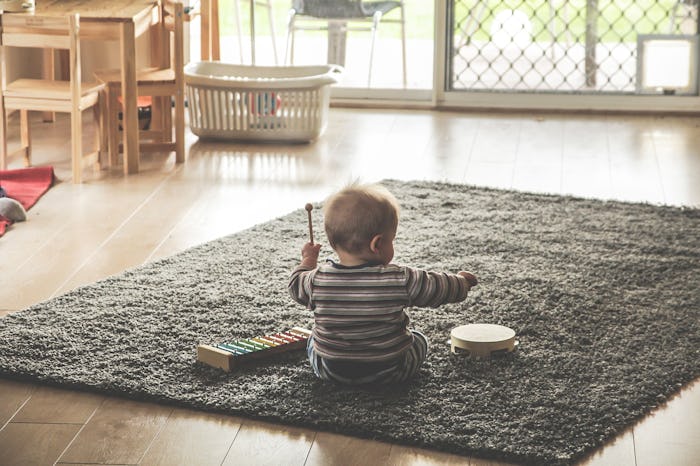Life

A Timeline For Replacing Your Baby's Toys
More often than not, babies and toddlers are kind of gross. And it's not necessarily because they're setting out to be that way, it's just kind of how they are. They're curious little creatures who explore the world around them. And, honestly, the world around them is filled with gross germs. Whether they're dragging their toys around with them or heading out on their own before returning to snuggle and play, toys can get a little dirty. Toys can be cleaned, but how do you know when you should replace Baby's toys instead of just giving them a good scrub?
Although it may not be as healthy as you'd assume to keep your kids perfectly clean and sterile, as noted by Johns Hopkins Medicine, you obviously don't want you kids to get sick. Birgit Pruess, an associate professor at North Dakota State University department of veterinary and microbiological sciences, conducted an impromptu (and unscientific - it didn't include precise samplings and wasn't standardized) experiment to see how much bacteria cling to various toys. According to an article in the Grand Forks Herald, Pruess found that a toddler's plastic giraffe, which was also used for teething, was the grimiest. Perhaps (or maybe not) surprisingly, a cell phone she took from a pre-teen came in second - something to keep in mind before handing your phone off to your toddler.
Before ditching toys or other personal items entirely, it's good to know if and how they can be cleaned and disinfected. According to Parents, bath toys can be one of the worst culprits when it comes to bacteria and mold, due to the fact that they're exposed to water and often don't drain all that well. The good news? They're usually fairly easy to clean. As Dr. Harley A. Rotbart, the magazine's health advisor, noted in the aforementioned Parents article, bath toys should be cleaned in a bleach solution once a month to kill anything unseemly. Stuffed, soft toys that are machine-washable should take a spin in the machine, according to Mom.me, and any that aren't should be scrubbed thoroughly with a mild detergent and warm water. Make sure to dry all freshly-washed toys to prevent undoing all the work you just did, too.
Though you want to keep your baby's most-loved toys around as long as possible (if only to avoid heartbreak and a solid meltdown), sometimes you really do just need to call it quits and throw a toy or other personal item away. Some items, like pacifiers, require replacement periodically due to use and regular wear and tear. According to the Baby Center website, if a pacifier starts to deteriorate, it's time to replace. That's a good rule of thumb for any toy, especially while your baby is at an age where everything may potentially end up in his mouth. Additionally, toys that simply can't be cleaned — either due to what they're made of or because there's just no coming back from what they were exposed to — should, at some point, probably get tossed.
It's easy to get worked up thinking about all the ways your kid can be getting exposed to viruses or other gross things - after all, you just want to keep them safe. But, as Dr. Brennan Forward said in the aforementioned Grand Forks Herald article, not all bacteria will cause disease, so don't stress yourself out too much trying to excise any and all germs from the house. Some bacteria really is useful, but some toys really should end up in the trash.